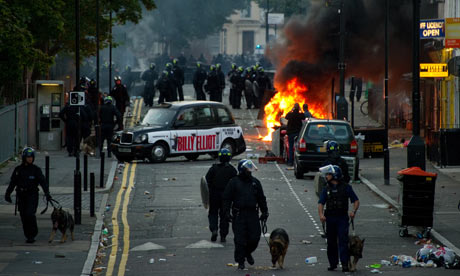
The increasing urbanisation of the globe is frequently discussed and worried over. This is ironic, as there has seldom been a period less preoccupied with how to create the city as a positive, active, collective polis rather than an atomised, accidental antheap. Libertarian bores uncritically hail sprawl, the megaslum or the megacity depending on the occasion, and an environmentalist left seems terrified of the city and all it implies. Kent-born, Baltimore-based geographer David Harvey has long been an exception to both. Rebel Cities collects recent articles for journals such as New Left Review and Socialist Register with recent broadsides on urban protest, and has the slightly valedictory tone of an idea whose time has come.
The essays here revise certain old-school Marxist judgments while making equally critical remarks on the young, "horizontalist" left dominant at, say, the Occupation outside St Paul's. Such a position could easily sound embattled or rancorous, and Harvey's precise, informative and sometimes droll prose tries to avoid angering his comradely opponents. This is less the case when he's writing about a contemporary capitalism now dominated by "a disgusting excrescence of human lust for greed and pure money power". He is forensic and ferocious in his dismantling of a recent World Bank report that upstandingly defended home-ownership as a route out of poverty and into urban citizenship, in the face of the chaos of sub-prime and foreclosure, or more precisely, in the face of mass evictions of poor people from their homes because they'd been cheated into mortgages they couldn't afford. He is very funny on the convenient belief that this is merely a response to unmediated popular demand: "home-ownership may be a deeply held cultural value in the United States, but cultural values flourish remarkably when promoted and subsidised by state policies."
Harvey's reworking of Marxist political theory places the city first and foremost, in terms of its position as a generator of capital accumulation, as opposed to, say, the factory. This is justified by an economic argument around the importance to capitalism of land, rent and speculation rather than production; of all the essays here, it's the one most tailored to the initiated.
That's not the case with his frequent recourse to the Paris Commune of 1871, a brief and bloodily-suppressed socialist experiment in working-class self-government. This recourse is not out of sentiment, but due to its relevance. The communards were "a very different kind of proletariat to that which much of the left has typically cast in a vanguard role". Like today's workers, they were "characterised by insecurity, by episodic, temporary and spatially diffuse employment, and very difficult to organise on a workplace basis". This has its own dangers, of course – the commune, as he notes, was an attempt at "socialism, communism or anarchism in one city", which could be starved out and destroyed. His notes on contemporary movements, such as the people's assemblies in Porto Alegre, bear this in mind. So how to connect the various metropolitan struggles?
For Harvey, there are two principal adversaries to organisation. One, the vanguard party of Leninism, is so distant a problem that he wastes little time dispatching it. However, he returns time and again to a critique of "horizontalism", a "fetish of organisational form" that too often remains at small-is-beautiful, an almost narcissistic concern with process and personal interaction over wide-scale action, something that "can work for small groups but (is) impossible at a scale of a metropolitan region, let alone for the 7 billion people who now inhabit planet Earth". This shying away from an organisation that isn't at a face-to-face level usually goes together with "hefty doses of nostalgia for a once-upon-a-time supposedly moral economy of common action". For Harvey, the left must be modern and urban or it will remain powerless.
Localism on a more municipal scale is analysed via some sharp remarks on the neo-Prussian redesign of Berlin, a conservative re-planning which, for Harvey, effaces the potential in the city's position between east and west, not to mention the possible contributions of its Turkish population. There's a refreshing willingness here to take post-68 urban politics to task; the urban conservation movements of that era are described as eventual handmaidens of gentrification, so that Michael Bloomberg can unironically talk of "building like Robert Moses with Jane Jacobs in mind", ie creating a landscape of capital accumulation and class cleansing that is no longer massive and modernist, but which proceeds through urban traditionalism, small-scale and unobtrusive. The left, for Harvey, has not properly learned that "neoliberal politics actually favours both administrative decentralisation and the maximalisation of local autonomy". As a response, he lingers over the anarchist Murray Bookchin's proposals for an association of democratic municipalities, a "confederalism" that resembles hundreds of Paris Communes.
But how to get to that point? Rebel Cities contains short notes on three possible present alternatives. In his vivid description of China, he sets up an opposition between Shenzhen, moving towards an extreme free-market liberalism, and Chongqing, which has taxed private capital to pay for council housing and social programmes. But this reproduces a "polarised choice between state and market", where both remain undemocratic.
The book concludes with very short, slightly hasty texts on the English riots and the Wall Street occupation last year. On the riots, he finds that the ubiquitous use of the word "feral" "reminded me of how the Communards in Paris in 1871 were depicted as wild animals, as hyenas, that deserved to be (and often were) summarily executed"; but he is surprisingly unwilling to attribute much political agency to the rioters. He's much more optimistic about "OWS", as a much needed direct and conscious claiming of public space against the "Party of Wall Street". There's no criticism here, which is fair enough; perhaps it's a sweetener for the astringent arguments elsewhere in this book.
Owen Hatherley's Uncommon is published by Zero.

